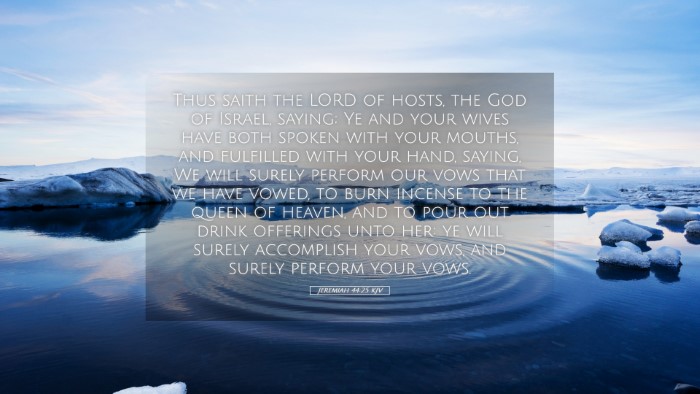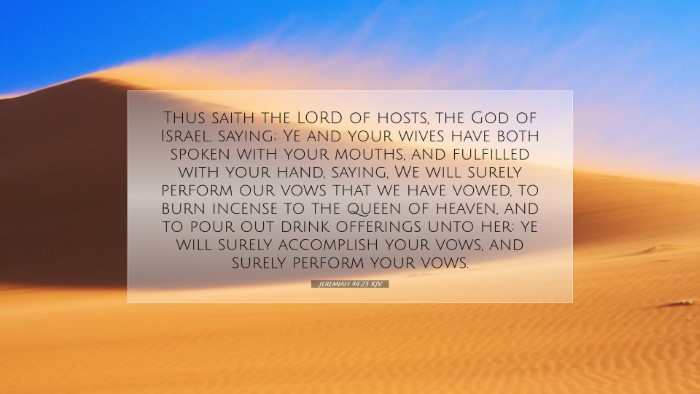Commentary on Jeremiah 44:25
Verse Text: "Thus saith the LORD of hosts, the God of Israel, saying; Ye and your wives have both spoken with your mouths, and fulfilled with your hand, saying, We will surely perform our vows that we have vowed, to burn incense to the queen of heaven, and to pour out drink offerings unto her: ye will surely fulfill your vows, and surely perform your vows."
Introduction
Jeremiah 44:25 presents a significant message from God through His prophet Jeremiah, addressing the actions and intentions of the people of Judah in Egypt. This commentary will explore the historical context, the theological implications, and the personal applications of this verse for today's readers.
Historical Context
The backdrop of Jeremiah 44 is the period following the Babylonian exile. The people of Judah, having fled to Egypt to escape judgment, continued their idolatrous practices despite God’s previous commands and warnings. The mention of the "queen of heaven" refers to a Canaanite goddess, indicating the syncretism that plagued Israel's worship.
Insights from Public Domain Commentaries
-
Matthew Henry:
Henry highlights the direct challenge that God's message posed to the people's idolatry, emphasizing their deliberate choice to break their vows to the Lord. Their actions reflect a deep-seated rebellion against divine authority.
-
Albert Barnes:
Barnes provides an extensive exploration of the cultural practices surrounding the worship of the "queen of heaven," pointing out that the people justified their actions by claiming to keep their vows. This suggests a critical view of the hypocrisy present within their religious observance.
-
Adam Clarke:
Clarke delves into the individual and communal implications of their vows, noting that while the people professed obedience, their behavior demonstrated a commitment to idolatry instead. He draws attention to the contrast between outward vows and inward sincerity.
Theological Implications
This verse serves as a poignant reminder of the dangers of hypocrisy in worship. It challenges the reader to reflect on the sincerity of their own commitments to God. Understanding God as a covenant-keeping God, this passage emphasizes that unfaithfulness to vows made to Him carries serious consequences.
Key Theological Themes
- Vow Keeping:
The importance of fulfilling one’s vows to God is underscored, as failure to do so denotes a lack of respect for His authority.
- Idolatry and Its Consequences:
The text illustrates the severe repercussions stemming from turning away from God to serve idols, especially in light of the consequences already faced by the exiles.
- God's Sovereignty:
This passage reaffirms the sovereignty of God, as He confronts the people’s rebellion with His authoritative word, reminding them of their accountability to Him.
Personal Applications
The relevance of Jeremiah 44:25 for contemporary readers is profound. Pastors, students, theologians, and scholars can draw critical applications that challenge the modern believer’s commitment to God in a society rife with competing allegiances.
Practical Reflections
-
Self-Examination:
Believers are invited to examine their own lives for areas where they may have made commitments to God but have failed to follow through due to the distractions and allurements of modern "idols."
-
Authenticity in Worship:
The passage calls for a return to genuine, heartfelt worship that does not compromise with cultural trends or practices that detract from honoring God.
-
Teaching and Accountability:
Pastors are encouraged to teach with clarity about the importance of keeping vows to God and the need for accountability within worship communities.
Conclusion
Jeremiah 44:25 stands as a powerful reminder of the significance of fidelity to God in worship and the dangers of idolatry. By combining insights from theological commentaries with contemporary applications, this reflection challenges readers to strengthen their commitment to God amidst a world of competing interests. Pastors and scholars alike have the opportunity to draw from this text to encourage communities of faith towards sincere and devoted worship.


